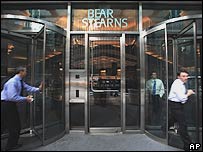
The headquarters of the InvestmAbu Dhabient Authority. The authority has a high profile in the emirate, but its secrecy is drawing scrutiny in Washington. (Charles Crowell/Bloomberg News)
Abu Dhabi has about 9 percent of the world’s oil and 0.02 percent of its population. One result is a surfeit of petrodollars, much of which is funneled into a secretive, government-controlled investment fund that is helping to shift the balance of power in the financial world.
After decades in the shadows, the fund, the Abu Dhabi Investment Authority, is turning heads on Wall Street and in Washington by making high-profile investments in the United States and elsewhere.
Known as ADIA (pronounced ah-DEE-ah), the fund recently formed a small team that is now buying big stakes in Western companies. This unit masterminded ADIA’s $7.5 billion investment in Citigroup, the largest U.S. bank, in November. It has also taken a large position in Toll Brothers, one of America’s biggest home builders.
“There is an idea that Abu Dhabi should not be the underdog of the map,” said Frauke Heard-Bey, a historian who has written a book about the political emergence of the United Arab Emirates. “They have the money to buy companies that are ailing, and why should they not? Why not make a mark?”
ADIA is the largest of the world’s sovereign wealth funds, giant pools of money controlled by cash-rich governments, particularly in Asia and Middle East. But Abu Dhabi, the wealthiest of the seven Arab emirates, says little about its fund. Few outsiders know for sure where ADIA invests, or even how much money it controls. And secrecy breeds hyperbole; some estimates of the fund’s size exceed $1 trillion.
Read moreAbu Dhabi fund draws scrutiny in U.S.





